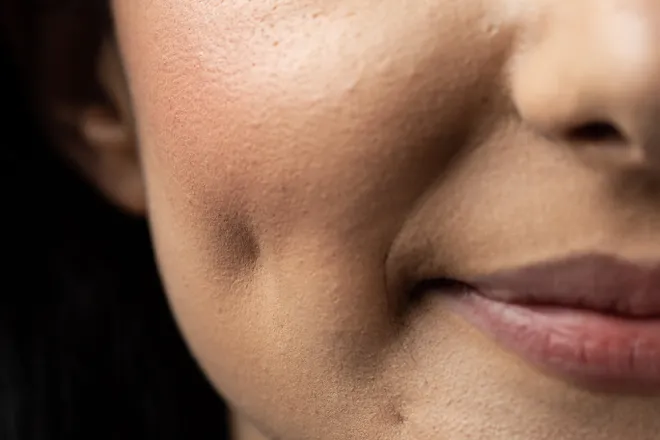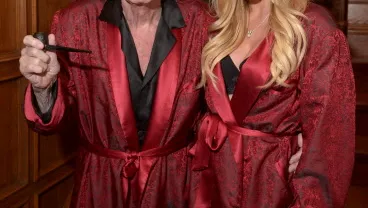'Dimple maker' trend is taking over TikTok, but could it cause permanent damage?

We always want what we don’t have, whether it’s a different hair color or longer lashes. Now, in what appears to be the rebirth of a beauty trend with a storied history, people are giving themselves pseudo dimples — and not the surgical kind, which yes, is a thing.
Behold the “dimple maker”: a cherry-shaped device with a curved wire sporting marble-like balls on each end. All you have to do, according to people on TikTok, is pry the device open and slip it onto your cheek as the balls clamp the inner and outer sides together.
Over time, the device may leave impressions on the muscles and fat pads in your cheek, although plastic surgeons who spoke to USA TODAY aren’t convinced they’ll last long. Doctors came to the same conclusion nearly 90 years ago after a woman named Isabelle Gilbert invented a similar product.
Today, interest persists and is growing. The hashtag #dimplemaker has over 60 million views on TikTok, with the devices springing up on Etsy and other shops for about $15.
Dimple makers are relatively safe, and are a less invasive alternative to a dimpleplasty — the surgical removal of muscle inside the cheek to create dimples — but experts say that they may still pose risks, such as permanent nerve damage and scarring.
“You want to be careful with home remedies and fads because nobody's counseling you about complications,” said Dr. Alan Matarasso, board vice president of development for the American Society of Plastic Surgeons. “You especially have to be careful with anything on the face that's not reversible.”
How do dimple makers work?
Dimple makers compress the skin and underlying fat in the cheek, squeezing fluid out of surrounding tissue and creating a temporary inward dent, according to Dr. Jonathan Kaplan, a plastic surgeon with Pacific Heights Plastic Surgery in San Francisco, California, who likens the device to a waist trainer.
It’s unclear how long it takes to work, but results will vary depending on how tight the clamp is, how long it’s worn and the amount of fat in the cheek, experts say.
Dimple makers can be helpful if you’re interested in getting a dimpleplasty, Kaplan said, because you can see how you’ll look with dimples and what placement best suits your face.
Risks of using dimple makers
Dimple makers that are too tight and worn for too long could potentially restrict blood flow to the spot on the cheek that’s being compressed, leading to the death of fat tissue (necrosis), Kaplan said.
A hard lump could develop in your cheek as a result, but it’s unlikely to be noticeable from the outside and can go away with time, Kaplan said. If enough blood supply is cut off, your skin cells in the area could die, which can leave a scab and scar.
A more unlikely yet still plausible risk of wearing dimple makers is nerve damage in the face, which could theoretically lead to paralysis in the upper and lower lip, Matarasso said, giving you a "I just had a cavity filled at the dentist"-type of smile.
“When you put pressure on a nerve, you have a certain amount of time until the nerve dies and then it's not reversible,” Matarasso said. “Think of it as a wet match — sometimes it'll dry off, but if you soak that match enough, it's never going to strike a fire.”
Dimplepasties carry similar risks because a surgical knife could pierce a nerve, but the likelihood of that happening is “extraordinarily low,” Matarasso said. Dimple makers, on the other hand, may pose greater risks of nerve damage because you’re compressing a larger surface area of the cheek, he added.
However, Kaplan speculates that most people wouldn’t be able to tolerate the pain associated with these kinds of injuries for long enough to sustain any kind of permanent damage.
Dimple maker trend is putting some people in awkward positions
As dimple makers become more popular, it's far from uncommon for 26-year-old Miya Ulatowski, who was born with dimples, to be accused of faking hers: “When I first started seeing those comments, it threw me off because I didn’t even know dimple surgery was a thing.”
While Ulatowski doesn’t understand dimples’ appeal, the Ohio resident said that she’s “a big supporter of people doing whatever they need to feel happy and confident in how they look.”
Meanwhile, people who opt for a dimpleplasty are frequently bombarded with hate about their decision to pursue the procedure. Merissa Fernandes, 32, of Massachusetts, said she has received pushback online since undergoing surgery in June, but acknowledges that it’s a consequence of being open about body modifications.
“I’ve always adored people who had dimples, so I got the surgery because I wanted to,” Fernandes said. “I’m not doing anything for the opinions of others, I just think it’s valuable to be as transparent as possible.”

Disclaimer: The copyright of this article belongs to the original author. Reposting this article is solely for the purpose of information dissemination and does not constitute any investment advice. If there is any infringement, please contact us immediately. We will make corrections or deletions as necessary. Thank you.







